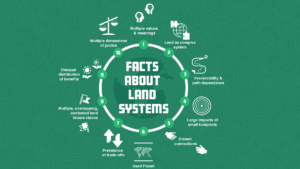Ten Facts about Land Systems for Sustainability
Our PNAS paper is just out, with a splashy infographic too:
Paper here: https://www.pnas.org/content/119/7/e2109217118
Infographic: http://10facts.glp.earth
BBC write up: https://www.bbc.co.uk/news/science-environment-60295788
It’s quite a dense paper – there’s about 30 years of work by the Land System Science community condensed in there – here’s the abstract:
“Land use is central to addressing sustainability issues, including biodiversity conservation, climate change, food security, poverty alleviation, and sustainable energy. In this paper, we synthesize knowledge accumulated in land system science, the integrated study of terrestrial social-ecological systems, into 10 hard truths that have strong, general, empirical support. These facts help to explain the challenges of achieving sustainability in land use and thus also point toward solutions. The 10 facts are as follows: 1) Meanings and values of land are socially constructed and contested; 2) land systems exhibit complex behaviors with abrupt, hard-to-predict changes; 3) irreversible changes and path dependence are common features of land systems; 4) some land uses have a small footprint but very large impacts; 5) drivers and impacts of land-use change are globally interconnected and spill over to distant locations; 6) humanity lives on a used planet where all land provides benefits to societies; 7) land-use change usually entails trade-offs between different benefits—”win–wins” are thus rare; 8) land tenure and land-use claims are often unclear, overlapping, and contested; 9) the benefits and burdens from land are unequally distributed; and 10) land users have multiple, sometimes conflicting, ideas of what social and environmental justice entails. The facts have implications for governance, but do not provide fixed answers. Instead they constitute a set of core principles which can guide scientists, policy makers, and practitioners toward meeting sustainability challenges in land use.”




